Some people get acne once in their lives when they hit puberty and get over it once they are in their mid-20s. However, others suffer from acne and pimples throughout their lives. Even if the acne is resolved, spots and scars remain, adding to the bad impact acne has on your life.
While managing acne has many treatments, most are invasive and make you cautious before your first session. How about we tell you that a non-invasive treatment can help you eliminate acne by treating its physiopathology and other benefits? Well, here is IPL for acne for you. Let us learn, “Does IPL eliminate pimples in this article?”
Table of Contents:
- Part 1: What is IPL for Acne?
- Part 2: Does IPL Work for Acne?
- Part 3: How Does IPL Get Rid of Pimples?
- Part 4: Benefits of IPL Treatment for Acne
-
Part 5: What Should I Expect from IPL Treatment for Acne?
What is IPL for Acne?
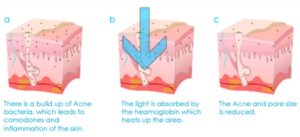 IPL for acne, uses a broad band of light waves to treat acne. These pulses of light are usually between 500 nm and 1200 nm and are more scattered than laser light.
IPL for acne, uses a broad band of light waves to treat acne. These pulses of light are usually between 500 nm and 1200 nm and are more scattered than laser light.
During the therapy, a non-coherent filtered light source is directed to the affected area that penetrates into the deeper layers of your skin. On reaching the depths, this energy is absorbed by the pigmentary cells and is converted into heat. The heat thus destroys the freckles, spots, and bacteria responsible for acne.
Does IPL Work for Acne?
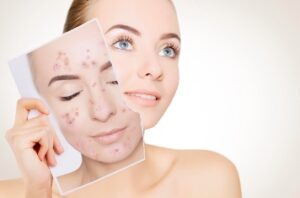 IPL treatment is now becoming famous worldwide for removing acne and acne scars. It is said to work for even severe cases of acne. M Kumaresan and C R Srinivas [1] conducted a study on 10 acne vulgaris patients.
IPL treatment is now becoming famous worldwide for removing acne and acne scars. It is said to work for even severe cases of acne. M Kumaresan and C R Srinivas [1] conducted a study on 10 acne vulgaris patients.
All the patients reported a reduction in their acne. After four sessions, a 49.10% reduction in acne was achieved. Hence, IPL treatment can work for acne. However, these results can vary from person to person.
In addition, it is not recommended for darker skin tones, pregnant women, Lupus, and those with porphyria.
How Does IPL Get Rid of Pimples?
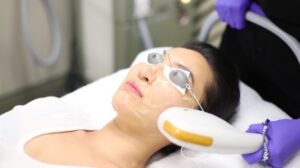 Let’s understand the mechanism behind IPL treatment for acne.
Let’s understand the mechanism behind IPL treatment for acne.
1. Kills the Bacteria Responsible for Acne
Propionibacterium acnes is a bacteria responsible for causing acne [2]. Different wavelengths of IPL photo facial work for different problems. For acne, the most suitable wavelength is 420nm.
As this energy is absorbed by the deep pigment cells of the skin, biochemical reactions start in our body. As a result, the heat produced by IPL kills the acne-causing bacteria.
2. Remove Hair that Becomes a Cause of Acne
The hair on your body can be a possible cause of acne. It can accumulate dirt and sweat, which can trigger acne. Excess body hair can also serve as a breeding ground for bacteria.
IPL energy is absorbed by the skin and hair follicles. It travels to the hair roots through these follicles and destroys them. In this way, an IPL session can also reduce body hair, thus decreasing the risk of acne.
3. Reduces Excess Oil Production
Sebaceous glands are tiny glands present all over the body. They release an oily substance to protect and hydrate our skin. Excess sebum production can also cause acne.
IPL targets the blood vessels supplying these glands and reduces their size [3]. Hence, sebum production is reduced, thus decreasing acne.
4. Calms Skin Inflammation
The IPL light also works on dilated blood vessels to reduce the skin inflammation associated with acne. It damages the blood vessels responsible for causing inflammation, reducing the inflammatory mediators produced in acne.
Furthermore, it increases the production of anti-inflammatory factors like TGF-β that can help reduce inflammation and promote healing.
5. Treats Acne Marks
The hyperpigmentation that occurs after acne is known as Post-Inflammatory Hyperpigmentation. This occurs as a healing response to skin trauma. IPL energy breaks down the bigger pigmentary molecules to a smaller size.
These are then washed away through the lymphatic system. In this way, IPL can also help reduce the scar marks left by acne.
6. Helps in Skin Rejuvenation
The heat generated by an IPL device stimulates collagen production [4] and increases the cell turnover rate. Increased collagen production is essential for maintaining skin hydration and its elasticity.
Moreover, it also reduces wrinkling and makes the skin appear fresher and younger. So, IPL gets rid of acne and makes your skin look more healthy and beautiful.
Benefits of IPL Treatment for Acne
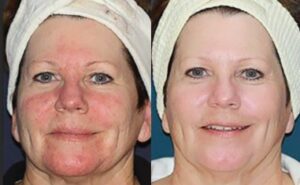 1. Quick Treatment Sessions
1. Quick Treatment Sessions
Since the IPL light is scattered, an IPL device can quickly cover the larger surface area in less time.
An IPL treatment session for acne lasts only about 15-20 minutes, but the time can vary slightly depending on your specific concern. So you will not have to sit for hours and cause pain in your back.
2. Visible Results in a Few Weeks
Usually, acne therapies and medications take a long time to treat acne. Some of them even leave behind the acne marks on the skin.
IPL is different as it can show results within a few weeks as long as you comply with your sessions. Additionally, the downtime for IPL is also quick. It usually lasts 4-6 hours but can also go up to 1-2 days, depending upon your skin type.
3. Long-lasting results with Minimal Discomfort
Acne treatment either takes a long time, can be inconvenient, or develops again quickly. Unlike these, IPL treatment has minimal discomfort. You only feel a slight tingling sensation on the skin during treatment.
After the sessions are completed, the results last for months to years, depending upon the severity of the acne and your skin type.
4. Customizable
IPL treatment works for most types of acne, including inflammatory and non-inflammatory acne. Therefore, the treatment can be customized for each individual depending on their acne type, skin type, and severity of acne.
You can consult a professional and meet with your specialist to learn what works best for you.
What Should I Expect from IPL Treatment for Acne?
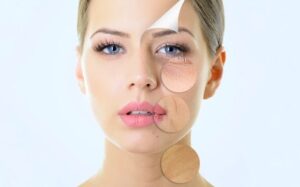 1. Aftereffects of IPL Treatment
1. Aftereffects of IPL Treatment
After an IPL photofacial session, the treated area might experience some redness, swelling, or discomfort. Your skin might also become sensitive immediately after the treatment as your body responds to the heat.
These are only temporary side effects that subside within a few hours after the treatment. In rare cases, they can last for a few days to weeks.
2. Number of Sessions Required for Desired Results
IPL treatment for acne works by targeting the deeper issues that cause acne. Therefore a single treatment session can never be enough to show you the complete results.
The therapy works gradually and requires a minimum of three to five sessions to achieve effective results. The number of sessions can vary depending on the severity of the acne and your skin type. Even different areas of skin require different numbers of sessions.
3. Aftercare of IPL Treatment for Acne
After an IPL treatment, your skin becomes sensitive, and you need to provide it with proper care. This ensures that the side effects of the treatment can subside quickly and your skin heals completely.
- For the redness and swelling to subside, you can use cold compresses
- Wash the treated area with warm water and a gentle cleanser to ensure that no bacteria attack it while it is still healing
- Avoid vigorous exercise as it can cause sweating, block the pores, and provide bacteria a chance to grow
- Ensuring that the skin is completely hydrated can help with quicker healing. So, use a gentle, non-comedogenic moisturizer on the skin after IPL treatment
- As the skin after an IPL session becomes sensitive, one must avoid hot water showers as it can irritate the skin, slow down the healing process, and worsen the side effects
Conclusion
IPL technology can help in treating different types of acne and acne marks. The heat energy released by an IPL device can kill the acne-causing bacteria and promote skin rejuvenation. So, your skin can become acne-free and smooth with just a few IPL sessions.
The number of sessions can vary from person to person, depending on their concerns and skin type. Hence, the treatment is not only effective but also customizable. If you take proper care of your skin after the therapy, the results can last for months to years.
References
[1] Kumaresan, M., & Srinivas, C. R. (2010). Efficacy of ipl in treatment of acne vulgaris: comparison of single- and burst-pulse mode in ipl. Indian journal of dermatology, 55(4), 370–372. https://doi.org/10.4103/0019-5154.74550
[2] Bhatia A, Maisonneuve JF, Persing DH. PROPIONIBACTERIUM ACNES AND CHRONIC DISEASES. The Infectious Etiology of Chronic Diseases: Defining the Relationship, Enhancing the Research, and Mitigating the Effects: Workshop Summary. Washington (DC): National Academies Press (US); 2004. https://www.ncbi.nlm.nih.gov/books/NBK83685/
[3] Piccolo, D., Kostaki, D., Dianzani, C., Crisman, G., & Conforti, C. (2022). Effective Intense Pulsed Light Protocol in the Treatment of Moderate to Severe Acne Vulgaris of the Chest and Back. The Journal of clinical and aesthetic dermatology, 15(3), 22–25. https://pubmed.ncbi.nlm.nih.gov/35342499/
[4] Barikbin, B., Akbari, Z., Vafaee, R., & Razzaghi, Z. (2019). The Efficacy of IPL in Periorbital Skin Rejuvenation: An Open-Label Study. Journal of lasers in medical sciences, 10(Suppl 1), S64–S67. https://doi.org/10.15171/jlms.2019.S12

 By myulikeadmin
By myulikeadmin



